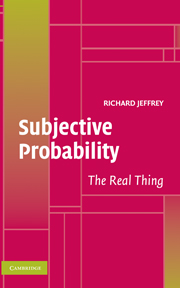Preface
Published online by Cambridge University Press: 05 June 2012
Summary
Here is an account of basic probability theory from a thoroughly “subjective” point of view, according to which probability is a mode of judgment. From this point of view probabilities are “in the mind”–the subject's, say, yours. If you say the probability of rain is 70% you are reporting that, all things considered, you would bet on rain at odds of 7:3, thinking of longer or shorter odds as giving an unmerited advantage to one side or the other. A more familiar mode of judgment is flat, “dogmatic” assertion or denial, as in “It will rain” or “It will not rain”. In place of this “dogmatism”, the probabilistic mode of judgment offers a richer palate for depicting your state of mind, in which the colors are all the real numbers from 0 to 1. The question of the precise relationship between the two modes is a delicate one, to which I know of no satisfactory detailed answer.
Chapter 1, “Probability Primer,” is an introduction to basic probability theory, so conceived. The object is not so much to enunciate the formal rules of the probability calculus as to show why they must be as they are, on pain of inconsistency.
Chapter 2, “Testing Scientific Theories,” brings probability theory to bear on vexed questions of scientific hypothesis-testing. It features Jon Dorling's “Bayesian” solution of Duhem's problem (and Quine's), the dreaded holism.
- Type
- Chapter
- Information
- Subjective ProbabilityThe Real Thing, pp. xi - xviPublisher: Cambridge University PressPrint publication year: 2004



